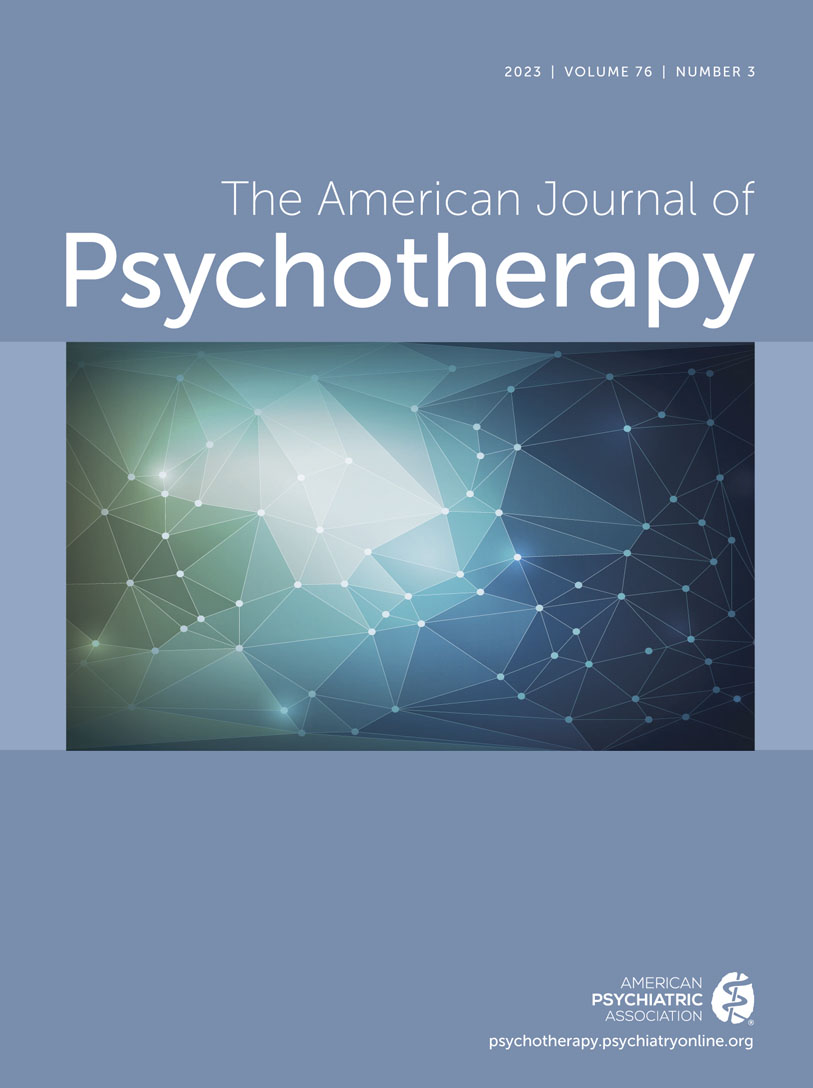American Journal of Psychotherapy
- Volume 56
- Number 3
- July 2002
Articles
Publication date: 01 July 2002
Pages322–337When patients fail to respond to psychopharmacologic treatment, one reason is that the meanings that treatment and/or wellness hold for them are psychologically intolerable. The result may be noncompliance with medications or the repeated emergence of ...
https://doi.org/10.1176/appi.psychotherapy.2002.56.3.322Publication date: 01 July 2002
Pages338–346The ideas contained in Wilhelm Reich’s Character Analysis, while very influential have not been thoroughly exploited in psychoanalysis and psychotherapy. These ideas, aimed particularly at producing genuine change rather than mere intellectual ...
https://doi.org/10.1176/appi.psychotherapy.2002.56.3.338Publication date: 01 July 2002
Pages347–361This study examined the relationships among patient affect (experienced and expressed), work, and outcome in two forms of time-limited, short-term group therapy for complicated grief. Work was defined as the degree to which the patient pursued the primary ...
https://doi.org/10.1176/appi.psychotherapy.2002.56.3.347Publication date: 01 July 2002
Pages362–377Many mental health providers believe that psychodynamic psychotherapy under managed care is virtually impossible. Notwithstanding the many adversities posed by managed care, there are ways to productively apply psychodynamic principles within this health ...
https://doi.org/10.1176/appi.psychotherapy.2002.56.3.362Publication date: 01 July 2002
Pages378–390Objective: This study explores the role of guilt in adolescents with anorexia nervosa. Numerous clinical observations have suggested guilt in adolescents or parents contributes to the development of anorexia nervosa, though systematic assessment of this ...
https://doi.org/10.1176/appi.psychotherapy.2002.56.3.378Publication date: 01 July 2002
Pages391–410The potential for countertransference complications in trauma work is generally known by now. “A priori” countertransference demonstrates that thoughts, emotions, and prejudices are evoked by preliminary information about a client even before the first ...
https://doi.org/10.1176/appi.psychotherapy.2002.56.3.391Publication date: 01 July 2002
Pages411–423This paper explores the impact of change on a psychiatry trainee’s development through a case presentation. During training psychiatry residents are exposed to constant transitions with frequent shifts in training sites and supervisors. Change is perhaps ...
https://doi.org/10.1176/appi.psychotherapy.2002.56.3.411Publication date: 01 July 2002
Pages424–437The findings of an international workshop on improving clinical interactions between mental health workers and suicidal patients are reported. Expert clinician-researchers identified common contemporary problems in interviews of suicide attempters. ...
https://doi.org/10.1176/appi.psychotherapy.2002.56.3.424Book Review
Past Issues
View Issues Archive
Vol. 77 | No. 2

Vol. 77 | No. 1

Vol. 76 | No. 4
